Check out some books by your tutor Fiona Veitch Smith … (click on the book covers to find out more)
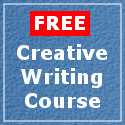 Hello everyone, welcome to the first session of our free online creative writing course. Over the next eight sessions we will be looking at different aspects of creative writing and trying our hand at various forms. I’d strongly encourage you to have a go at the exercises along the way, and please feel free to leave comments or ask questions at the end. If you have arrived on this page without first reading the home page and frequently asked questions page (on tab above) please go back and do so now. If you have read them, enjoy the course!
Hello everyone, welcome to the first session of our free online creative writing course. Over the next eight sessions we will be looking at different aspects of creative writing and trying our hand at various forms. I’d strongly encourage you to have a go at the exercises along the way, and please feel free to leave comments or ask questions at the end. If you have arrived on this page without first reading the home page and frequently asked questions page (on tab above) please go back and do so now. If you have read them, enjoy the course!
Creativity and Art
What is creativity? The Collins dictionary defines it as ‘the ability to cause something to exist’. Without getting into too much of an existential discussion, I would say that with every thought that is expressed, something has been created. It was Descartes who said: ‘I think, therefore I am’; well I would add, ‘I think, therefore I create’ (do you feel a God complex coming on?). But how do we express our thoughts? Sometimes we do it verbally, other times by body language and still again through what is loosely termed ‘art’.
Art takes place when a thought is expressed and fixed in a way that other people may experience it on an aesthetic level – through music, writing, painting, sculpture, choreography and so on. Many artists say that their best work takes place when they ‘by-pass’ the thought and simply express the feeling. This may be true, but for writers, who use a verbal medium, a feeling must first be converted into a thought before it can be put into words. Don’t over analyse the thought before you express it, as this way you can ‘channel’ the purest interpretation of the feeling, but some cognitive process needs to take place. Some writers prefer to mull over a thought and give it form before they put pen to paper – I’m one of them – but it’s good practice to try and switch off the ‘editor’ at least for the first draft. First response trigger exercises are useful in this regard and can release some unexpected words and images.
Exercise 1:
Write down your first response to these words or phrases:
- Blue ball
- And that’s when the sadness came
- Coffee
The first task of a good writer is to convert feelings into thoughts and then into words. This is the raw material that can then be converted into something more permanent. Some writers refuse to toy with their first drafts, believing their creativity will be diluted; I disagree. Allowing your critical mind to improve a piece of writing is where the craftsman meets the artist. Something produced only by the former will lack soul and something by the latter will lack form. Good writing is a combination of art and craft.
For public consumption
Art, of course, is highly subjective and one woman’s masterpiece is another woman’s unmade bed. We all have the ability to create, but whether or not our creation is ‘art’ must be left to the eye or ear of the beholder.
In this session we will look at how you can craft those creative thoughts into creative writing to share with other people. And that’s what sets ‘public’ writing apart from ‘private’ scribblings – there’s a perceived readership in mind. When I ramble on in my journal, I am the only one who will read it (hopefully!) so my only concern is getting my thoughts down on paper. The moment I want someone else to read it I begin to consider ways to improve the presentation and craft it into something more aesthetically pleasing. I consider which words may sound more colourful, whether or not my sentence structure is grammatically correct, whether I’m using evocative imagery, and so on.
Story, feeling or image?
What is it about those creative thoughts that you think might be of interest to other people? Do they speak of an eternal truth or a common experience? Do they make you laugh or cry? Do they suggest a story that will entertain or a poem that captures a moment that must be shared?
Exercise 2: In 50 words or less write down why you want to write then list three creative thoughts that you’ve had lately (each 10 words or less). These may be an image, a musing, a ‘truth’, a story, or so on. If you haven’t had any, take yourself for a walk and look around; what grabs your imagination? Browse through a newspaper or a magazine; do any stories or pictures catch your attention? Think back over your day; did anything funny, charming, shocking or unusual happen to you or someone you know?
Poetry or prose?
Some people are more suited to writing poetry than prose and some people do well at both. Although we won’t be discussing it in this course, other people are more suited to script. I’m one of them. I’ve had relative success as a prose writer and in fact have managed to earn a living from it, but it’s taken years of hard work to get to this point. I recently branched out into scriptwriting and found that I had much more of a natural ability. (If you’re interested in finding out more about scriptwriting, check out getting started in playwrighting). You may find that you’ve been trying to make it as a poet when actually you’re more suited to prose. Now I don’t want to pigeonhole anyone, but ask yourself the following questions:
- Are you more attracted to films than stills?
- Do you enjoy telling people ‘stories’ from your life?
- Do you prefer to read stories or poems?
If yes, to these, then you may be more suited to prose than poetry. If no, then the opposite may be true. If it’s ‘sometimes yes, sometimes no’ then perhaps you are suited to both. We shall be looking at how to write poems in more detail in session 7, but suffice to say, a poem is like a snapshot of a moment. If you can’t rest until you know what happened before and after, then prose may be your genre.
Exercise 3: Take one of the three creative thoughts you wrote down in Exercise 2, then list 20 separate words that communicate or describe that thought. Do not, at this stage, link the words into sentences. Once you have your 20 words use them in a poem of 16 lines or less. Then, take the same 20 words and work them into a short story of under 300 words. Which exercise came more easily? Which form has best communicated your creative thought?
Further Resources:
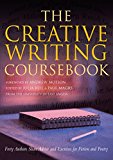
There are some excellent resources out there for creative writers. To get quick ‘starter’ images when your own well is dry I recommend The Writer’s Block by Jason Rekulak. I’m currently working through The Creative Writing Coursebook by Julia Bell and Paul Magrs and finding it very useful.
The next creative writing course session is how to write a short story. But before you move on to that, please feel free to leave a comment or ask a question in the box below.
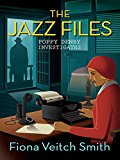
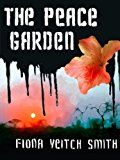
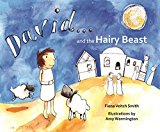
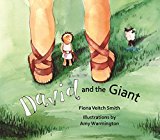
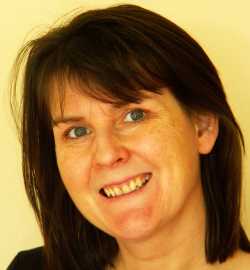 Welcome to The Crafty Writer's free online creative writing course, presented by Fiona Veitch Smith, a freelance journalist, editor, author, playwright, screenwriter and writing teacher. I hope that you'll see a dramatic improvement in the quality of your writing as you work through this course.
Welcome to The Crafty Writer's free online creative writing course, presented by Fiona Veitch Smith, a freelance journalist, editor, author, playwright, screenwriter and writing teacher. I hope that you'll see a dramatic improvement in the quality of your writing as you work through this course.
Thanks for sharing this. I have been published in academic articles but I wanted to do some creative work. This is a nice refresher course.
You’re welcome Leann. Hope you feel refreshed and the creative juices are flowing.
Fiona
Writing had been on my mind since the age of 13, that’s why I have made it to your site. I am much older now, watching my adult children getting ready to move on with their lives. I started to scour the web last spring for paid/free online or in-person workshops because I wanted to start slow and to understand firsthand some of the ground rules of creative writing, but nothing turned up. I am so glad that I did not give up on continuing to search as I stumble today upon your website. At first glance I knew your site is exactly what I’ve been looking for. Thank you for your willingness and goodness to offer your talent the way you do. Your rewards for doing so shall be many a fold. Thank you for getting me on my way.
Thank you Bernadette. I hope you get what you need out of the course. Happy writing, Fiona.
Thanks for sharing your experience and giving me a starting place to begin developing as a writer.
You’re welcome, Rowena.
Hi Fiona, I find it incredible that you still reply to comments after all these years! I have to admit that when you said write down three creative ideas my mind went blank. But I wrote down three thoughts, then erased them because I wasn’t certain they were creative. I really appreciate what you’ve told others in the comments that the 3 ideas are ANYTHING that can be turned into something. I think when we hear the word “creative” we tend to overthink the process. So I’ve gone back and un-deleted what I’d written and I’m ready to continue now without being a big baby about it. Thanks again for leaving this course up all these years for all of us to benefit from. May life bring you many good things.
Thanks again for leaving this course up all these years for all of us to benefit from. May life bring you many good things.
I’m surprised I’m still sane after all these years Steph But the reason I do is that it gives me great satisfaction to know that people like you are being helped to realise that creativity is not some mysterious thing out there but simply a matter of letting what’s inside out. The craft of writing is what to do when the creative is out, but it’s sad that some people don’t take the first step. I must say it can be frustrating on this course when people ask me the same questions over and over again (eg how do I start, will you give me feedback on my writing, where do I ‘submit’ the exercises or simply what’s in the course?) and they clearly haven’t read the intro page; but there are far more people like you who embrace it for what it is and get something out of it.
But the reason I do is that it gives me great satisfaction to know that people like you are being helped to realise that creativity is not some mysterious thing out there but simply a matter of letting what’s inside out. The craft of writing is what to do when the creative is out, but it’s sad that some people don’t take the first step. I must say it can be frustrating on this course when people ask me the same questions over and over again (eg how do I start, will you give me feedback on my writing, where do I ‘submit’ the exercises or simply what’s in the course?) and they clearly haven’t read the intro page; but there are far more people like you who embrace it for what it is and get something out of it.
Happy writing
Fiona
Fiona,
I finished your book The Peace Garden and thoroughly enjoyed it. You are, indeed, a gifted writer. I wrote a review on Amazon for you. I hope others will buy the book. Thank you for sharing your gifts with us through this website and through your writing. Please do a sequel so that we know what happened to Natalie and Thabo!
Thank you very much Pat. I’m so glad you enjoyed The Peace Garden. And yes, I am considering a sequel called Scorpion Rain when Natalie goes with Thabo to South Africa. I’ll let you know when it’s ready! And thanks very much for the Amazon review. All the best,
Fiona
Hello, does one need to have a creative writing degree in order to write a book or get published?
No, you just need to write a brilliant book then be in the lucky 5% of those brilliant writers who happens to get noticed by a publisher. Then be even luckier and actually get published. If you already are a great writer, just write. If you feel you need help developing your writing (most people do), then do the degree or sign up for some community creative writing courses. But completing a course or getting a degree will not guarantee you publication. Sadly, there are many wonderful writers who will never see their work in print.
Thank you for offering this free writers course. I am a total beginner and only write occasionally. I do not call myself a writer, however I like to write. I like the idea in gaining some writing experience and support. The great thing about a course like this is being able to put words together with more confidence without having any pressure. Thank you once again for helping me begin a new journey for the sheer fun of it.
YOu’re welcome. Have fun!
thx very much fiona 4 everything i do all ur exercises and i feel better already really thank u 4 everything u do 4 us after all these years
Great excersizes.
This really does help a lot.
Number one key for writing practice!
Thank you for putting up this free creative writing course!
Many people have told me I should write, so I finally looked into it and came upon your free lessons. I have always found words come easily to me so hope to find satisfaction in putting them on paper. I wonder about writing my memoirs as I have had, to say the least, an interesting life. In fact, if I wrote everything, I dare say some would not believe it to be true and would even think that I had run amok with too much fiction. What is your opinion on autobiographical writing shrouded under the guise of a fictionalized piece of work?
Hello Sue,
My personal opinion is that an autobiography should be non-fiction. If you are interested in writing from your own life check out my free non-fiction writing course http://non-fiction-writing-course.thecraftywriter.com/ However, this does not mean you cannot draw on your own experience in your fiction. I have done that to some extent in my novel The Peace Garden; but it is still clearly fiction. If you would like to read about what is based on my own experience, I blog about it here http://fiona.veitchsmith.com/2011/10/where-did-the-peace-garden-come-from/
Happy writing
Fiona
I really enjoyed this lesson. I have, what seems like, a lot of ideas for writing, but I have trouble getting it on paper. I am hoping these lessons will help.
Barbara
Really nice stuff, I enjoyed it.I love to write, especially fictional stuff, due to the fact that I was raised in a family that loves reading (mostly novels).It made me decide that someday I want to share my imaginative ability with the world.Problem is I have difficulty putting my ideas to words.Any help here?
The course will help you Sushe.
What a great site – inspiring and fun! Never thought I’d put heroes and goldfish in the same sentence.
Thank you for a much needed (and free no less!) boost.
A goldfish hero? Now there’s the start of a great children’s story. Happy writing, Pookie.
Im so excited to find your site! I havent been writting lately and wanted to get back into it. You are giving me the kind kick in the pants I need! I very much enjoyed this lesson. The exercise for me was based on a picture a workmate took. She went to the gas station one day and of all things, a school bus full of llamas pulled up! (I swear its true, I have the pictures to prove it!:) Anyway, I thought, what a great childrens book idea. So, I’ve written my poem based on my twenty words. Now Im working on the short story. Thanks so much!
I’m already loving your creative course and i just started today thank you so much for giving this course and your full advice free of cost ,in this many other course would charge a fee where some people cannot afford it thanks again.
So far I am really enjoying your lessons. I have a great idea for a book, but haven’t the discipline (yet) to set fingers to the keyboard. Thank you for everything.
I’ve pinned this page for a while and only now worked through this first page. I was inspired, the text got me in the right frame of mind and I managed to write (what I think is) a really good poem. I’m looking forward to the next session.
thank you so much….i found this really helpful:)
Thanks for this great and interesting course. i want to become a writer. i will go to college and major in english and literature. i’ve been good at writing all of my life. in school i was always placed in advanced english and literature classes. when i went to college i was placed in honor’s english. i want to write for publication and try my hand at freelance writing. Thanks again.
Thanks for this interesting course. I want to go back to college to pursue a degree in english and literature. I was always good in english at school, always being placed in advanced and college level courses.